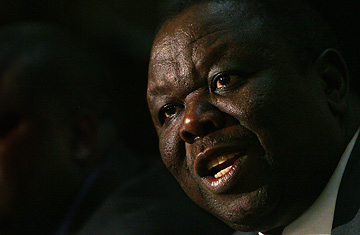
Zimbabwean opposition leader Morgan Tsvangirai.
Morgan Tsvangirai is leader of the Zimbabwean opposition Movement for Democratic Change (M.D.C.). His party won a parliamentary majority in the March 29 general election, and claims Tsvangirai also won the presidential race, beating Robert Mugabe, who has ruled Zimbabwe for 28 years, with 50.3% of the vote. The official results have yet to be released, as Mugabe's Zimbabwe African National Union-Patriotic Front (Zanu-PF) have demanded a recount. The state press is predicting a run-off between Mugabe and Tsvangirai, and a loose pro-Mugabe force known as the "war veterans" has begun a campaign of intimidation and land seizure across Zimbabwe. Tsvangirai spoke to TIME's Africa bureau chief, Alex Perry, by telephone from an undisclosed location inside Zimbabwe.
TIME: It's 10 days since the vote, and there are all sorts of rumors as to the direction of Zimbabwe, the intentions of Mugabe and the fate of the M.D.C. How do you see the situation?
TSVANGIRAI: We are planning to use our political influence in the region to put pressure on Mugabe to concede defeat. He is trying to be defiant. The military leaders in the establishment are trying to subvert the will of the people. This is, in a sense, a de facto military coup. They have rolled out military forces across the whole country, to prepare for a run-off and try to cow the population. It's an attempt to try to create conditions for Mugabe to win.
Things look tough for you and the M.D.C.
There's no doubt about that. Why should the population vote again? Why should they bother? Already, [voter turnout figures show] there has been a substantial decrease in the interest of the population in politics.
What keeps you going at difficult moments like these?
I suppose it's the inspiration [I draw from] the resilience of the people. They maintain faith with our leadership, and with the idea that our goal can be achieved.
But can that goal be achieved with all the forces arraigned against you?
What you have to understand is that the struggle for democracy in Zimbabwe is entering a new phase. This is no longer about elections. It's now about the transfer of power. Now, this transition is going to be difficult. Bob [Mugabe] is resisting. But he has no control of parliament. And the election delegitimizes him even among his supporters in the region. Everyone now realizes he is a cheat. How can he be an effective leader in those circumstances?
Still, it's very difficult to fight dictatorship with democratic means. We always ask ourselves how we can do that. We're always conscious of the huge task we've set ourselves. But we try to instill democratic values in our activists and workers, particularly the younger ones who would like to confront Mugabe with extreme measures. We have managed to restrain them. But it's not easy. We're taking on the whole edifice, a dictatorship that has been institutionalized into all the organs of state. It's a very big mountain we have to climb.
There's another new phase at issue here, isn't there? The idea that Zimbabwe, and Africa, is entering a new era where it is no longer ruled by liberation leaders who see government as the righteous reward for their independence struggle, but where government is more accountable and judged on delivery?
It's a new phase, yes. The nationalists fought for our independence, and they played that part gallantly. But today we need a new phase of democratic leadership. We do recognize the role the independence fighters played in winning our land from the colonialists — but they have run the country down. We need to shift from focusing on our independence, to start focusing on our prosperity and freedom.
One of the big questions in Zimbabwe is always, what is going on in "Uncle Bob's" mind. What do you make of him?
Bob prompts two conflicting emotions. We want to regard him as a father figure, as a liberation hero. But he is also a ruthless tyrant and dictator who has brought economic decay. I think, now, that people will always remember this election. Bob has failed, and he is betraying the aspirations of the liberation struggle. His legacy is being affected.
Let's turn to you. Others have raised questions about your capacity as a leader. You even have a split in your own party for that reason. What's your response to the criticism you draw?
Every leader has his faults. I am not a perfect human being, and if you are looking for Mr. Perfect, I don't think you can find him in any leader. I try to take those criticisms in my stride.
That's not an admission you'd expect to hear from Mugabe.
We need a new political and economic ethos in Zimbabwe. And for that, we need to develop a totally different paradigm in terms of what leadership means. I have known Mugabe for many years. [What he does not understand is] being firm does not have to mean that you are a dictator. Providing leadership does not mean you are not able to rule by consensus. We try to ensure we are democratic. We are also aware that at the end of the day, decisions have to be taken.
What lies in the future for Zimbabwe?
We'll manage to get Mugabe out. Mugabe is being deserted. No one wants to touch Mugabe in the region now. Eventually, we will ease him out. After that, we need to set the country in a new direction, giving people freedom, dignity and opportunity. Zimbabwe has potential. With all our resources, mineral and human, we are well positioned to be a prosperous country.
